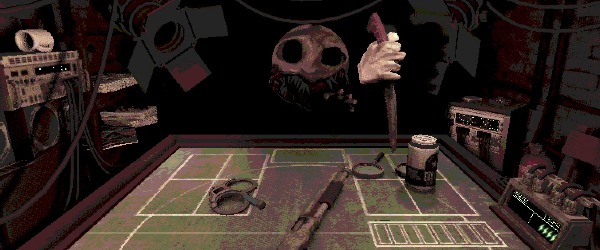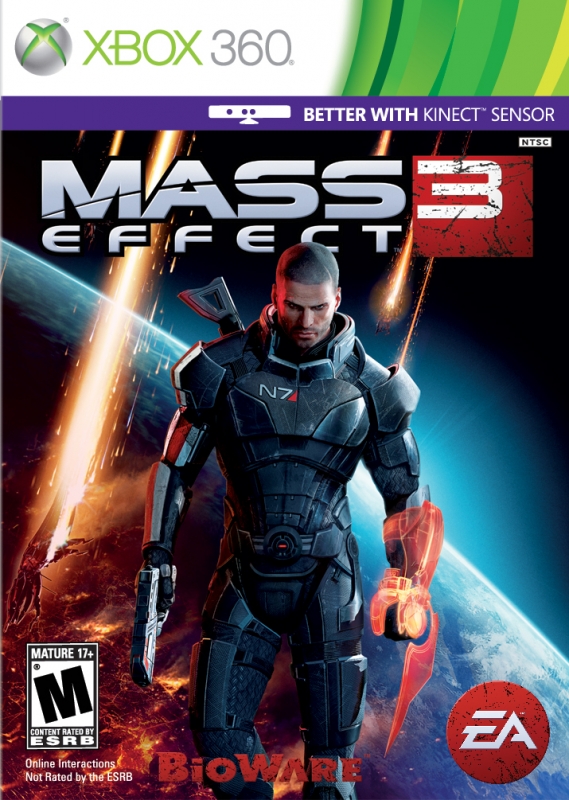
Mass Effect 3 - Review
by Jake Weston , posted on 18 March 2012 / 18,545 ViewsAlmost five years ago, acclaimed developers BioWare started what is arguably one of the most ambitious projects in gaming history: Mass Effect, a trilogy of interconnected games that provide you with difficult choices, and consequences that carry over in the sequels. Along the way, BioWare delivered two of the best RPG experiences of this generation. Now, it all culminates here, with Mass Effect 3. Does BioWare provide a fitting conclusion for their epic space opera, or have they bitten off more than they can chew?
Mass Effect 3 begins with what the previous two games have been ominously building up to: The arrival of the Reapers - giant, sentient machines intent on destroying all life in the galaxy. Commander Shepard, on trial for his actions from last year’s “Arrival” DLC for Mass Effect 2, is caught in the middle of the Reaper attack on Earth. Facing a losing battle, Shepard and the rest of the crew of the Normandy are forced to retreat into space, uniting the rest of the species of the Milky Way to not only take back Earth, but save all life in the galaxy. Those who haven’t played the “Arrival” DLC will definitely feel out of the loop, but fortunately BioWare does a great job of bringing both newcomers and series veterans up to speed.
Mass Effect 3 is available on PS3, 360, and PC, but you are doing yourself a huge disservice if you do not play it with imported Mass Effect and Mass Effect 2 save data from either the 360 or PC versions (the first game is not available on PS3). Virtually all of your choices throughout the series, big or small, have an impact on the world of Mass Effect 3. Entire scenes can play out differently depending on who lived or died in previous games, as well as other choices you’ve made. Past games in the series often gave you with the hard decision of choosing between the lives of two or more characters. Mass Effect 3 ups the ante by putting the fates of entire species in your hands.
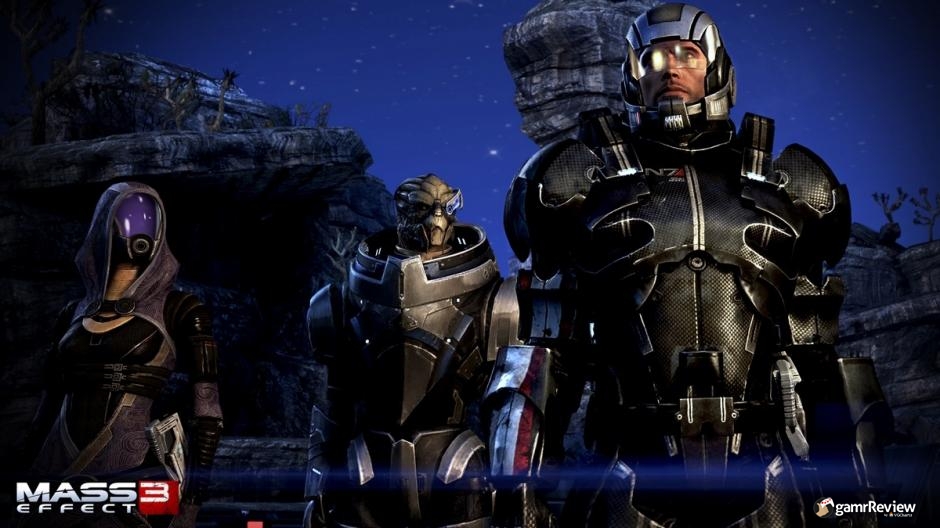
Your influence over the fate of the galaxy is far reaching in Mass Effect 3, and so is your control over the battlefield. Combat is refined from Mass Effect 2’s already great RPG-meets-third-person-shooter system, making this the most fun and responsive game in the series. You still fight alongside two squad-mates of your choice, and combine your abilities with theirs to gain tactical advantages in skirmishes. Squad AI is now much more intelligent than they were in previous games, and enemies follow suit, employing a much wider variety of tactics to make sure you don’t succeed against the Reapers.
Grenades make their return from the first Mass Effect, and are much, much less cumbersome this time around. The most prominent new gameplay addition by far, however, is Shepard’s new Heavy Melee abilities, close-quarters techniques specific to each of the six available classes. Soldier, Sentinel and Infiltrator classes get access to the extremely visceral and satisfying Omni-Blade, while biotic Adepts and Vanguards get a biotic Blast and Punch, respectively. If you go with the Engineer class, brace yourself, because you will punch fire.
The Kinect Factor - Nick Pantazis
Kinect makes its Mass Effect debut, but it's not a particularly positive addition. Controlling your squad through voice commands is great in theory, but in practice the noise from your TV speakers constantly interrupts Kinect's ability to understand you. I found myself shouting to make my squad listen at all, and even then I was lucky if it worked 75% of the time. You can adjust the dynamic range to try to fix this, but I found little success. In a game that demands precise control this is completely unacceptable. You can also use it to open doors or select dialog options, but this always feels silly. In fact, I actually unplugged Kinect, because the speaker feedback made this little red microphone alert pop up constantly on my screen as I played, which was irritating. The only way I found that it consistently worked and worked well was when playing with a headset and my TV speakers muted. This was enjoyable, but a hassle. It's certainly not "better with Kinect."
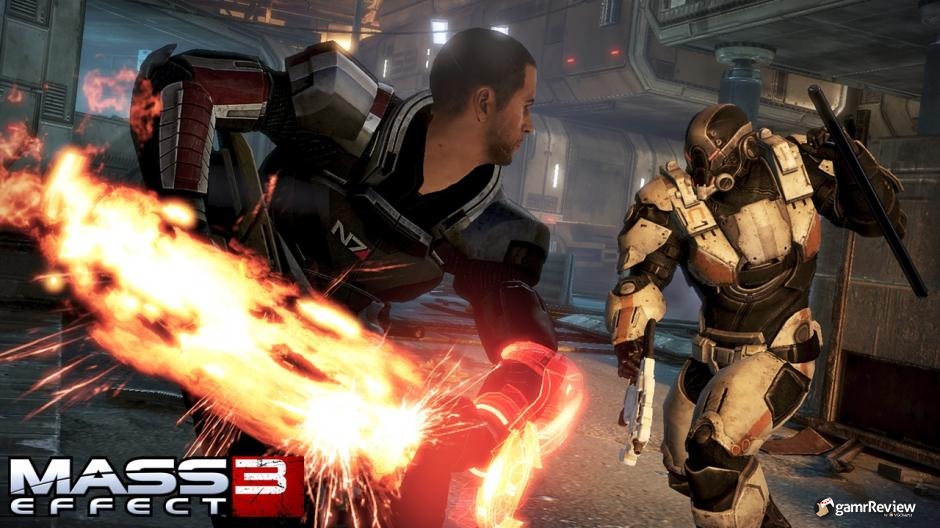
From its inception, the Mass Effect games have always prided themselves on high production values and top-notch voice acting, and Mass Effect 3 continues this tradition. Unreal Engine 3 may be over five years old, but you wouldn’t guess it from seeing this game in action. Voice-acting is the best in the series; characters convey emotion and personality much more effectively than previous games (which is saying a lot), and Male Shepard no longer sounds like a robot. The biggest standout is Martin Sheen’s Illusive Man, who, despite having a much more scaled back role compared to the previous game, carries an unrivaled amount of gravitas (If only the same could be said about Jessica Chobot’s much-publicized character, Diana Allers. Yikes.).
Many fans lamented Mass Effect 2’s seeming abandonment of RPG elements in favor of a more action-oriented approach, and thankfully Mass Effect 3 finds the perfect balance between the two. Did you like customizing your armor and weapons in the first Mass Effect? Great, because it’s back, and with a much better interface. Ability customization is also greatly expanded, with branching skill trees opening up as you get to the higher levels for all the characters. This, combined with the ability to reassign Shepard new skills outside of his class, means that one player could potentially use the exact same team as another player’s, but employ a completely different strategy.
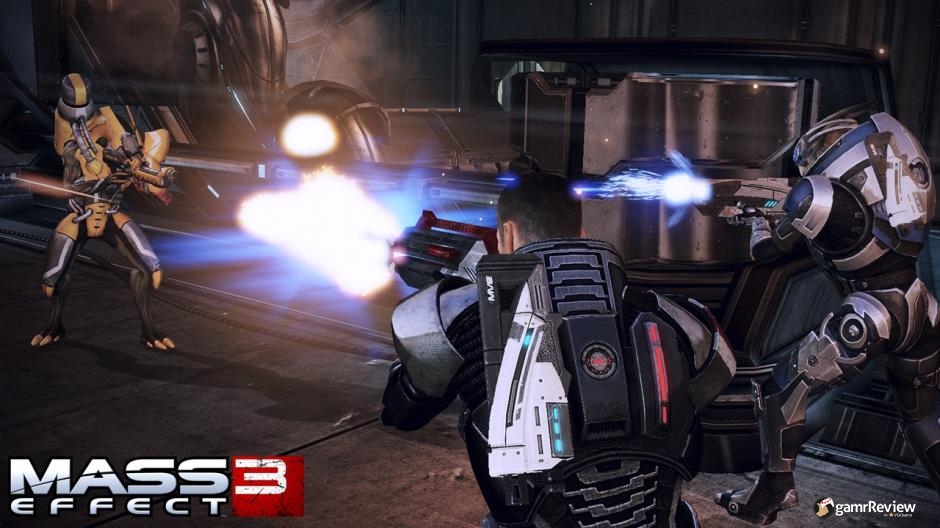
While Mass Effect 3 greatly expands your sway throughout the galaxy, it unfortunately loses a bit of its personal touch along the way. Side-quests in Mass Effect 2 were intensely personal and gripping, but in Mass Effect 3 there is somewhat of an emotional disconnect. These missions typically feature cameo appearances by characters from previous games, and while it’s great to see them again, they pretty much disappear afterwards, making it hard to feel like you’ve made much of an impact. The more minor side missions have been delegated to fetch quests accomplished by scanning planets (yes, planet scanning is back, but thankfully is much less of a chore this time around). Plus, a handful of side-quests are simply repurposed multiplayer maps thrown into the story. These missions lack the tight focus and design present in the rest of the game, and the disparity is jarring.
Thankfully, the multiplayer itself works rather well. While it’s essentially a horde mode at its core, the RPG elements combined with the camaraderie of working with up to three teammates online helps differentiate it from the crowd. Players must work together to complete various tasks randomly assigned during each mission, and the level of teamwork required to win as the difficulty ramps up becomes exhilarating. As reward, players earn in-game credits to buy booster packs, random packages which contain new weapons, item perks, and even characters. This randomness provided a huge level of addiction to the multiplayer, but it’s a shame that you can choose which you receive by spending real-world money in EA’s online store.
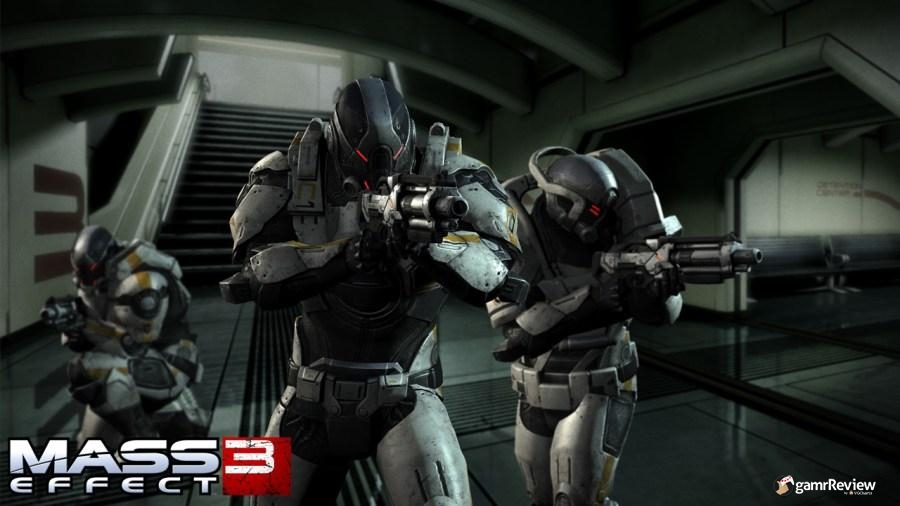
For the first time in the series, you can now play as races other than human - almost every major race is available in the multiplayer, including Turians, Asari, Drell, and of course, Krogan. The lack of Batarians and Geth definitely feel like a missed oppurtunity, but the it’s hard to complain with seven already varied options, combined with the six available classes. Many were hesitant when it was announced Mass Effect 3 would have multipayer, but it ends up being a welcome addition to the franchise. Fortunately, it’s not essential to getting the full Mass Effect 3 experience. While multiplayer progress can potentially affect your outcome in the ending, the effect is minor, and I’d say there’s no reason to play it if you’re only interested in the story.
And that brings us to the elephant in the room: the ending. Although it’s certainly not what we expected, I’m not sure if the extreme backlash from the internet lately is warranted. The choices you made throughout the entire trilogy do in fact affect the ending you receive, but not in the way most fans were hoping. I’ll admit, I was also initially opposed to the ending, but after a couple days to think it over, I’m glad BioWare went with a route that nobody saw coming. It sparked a reaction, and I’m pretty sure that’s exactly what they intended. Without spoiling anything, Mass Effect 3’s ending is controversial, thought-provoking, and unexpected. Honestly, I wouldn’t have it any other way.
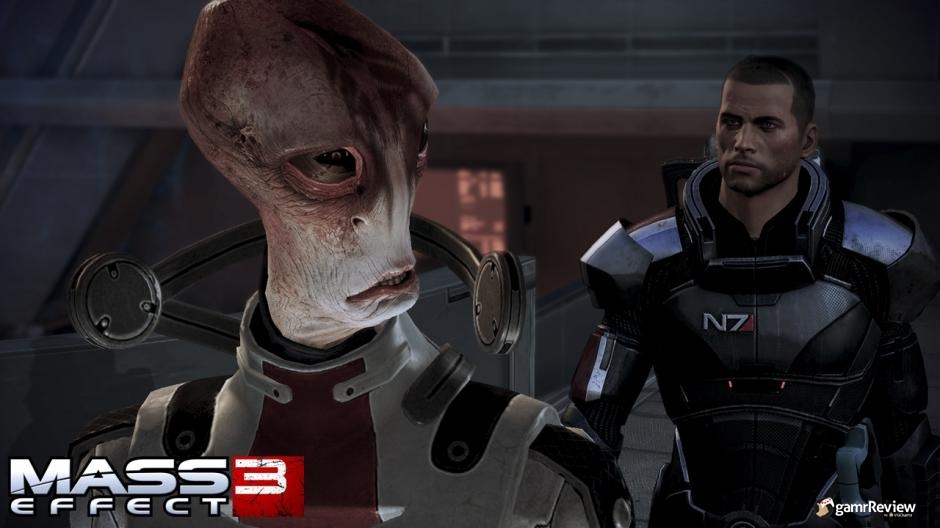
Mass Effect 3 provides an epic, emotional, and stunning conclusion to an unprecedentedly personalized trilogy. By combining the best of previous titles, BioWare has delivered not only the greatest game in the series, but an early contender for game of the year. Disappointments over the ending, as well as a couple other minor storytelling gripes may be disheartening to some, but don’t let that hold you back from immersing yourself in one of the most profound experiences in gaming.
This review was based on the Xbox 360 version of the game.
Xbox 360 Games - PS3 Games - PC Games - Cheats
Mass Effect 3 begins with what the previous two games have been ominously building up to: The arrival of the Reapers - giant, sentient machines intent on destroying all life in the galaxy. Commander Shepard, on trial for his actions from last year’s “Arrival” DLC for Mass Effect 2, is caught in the middle of the Reaper attack on Earth. Facing a losing battle, Shepard and the rest of the crew of the Normandy are forced to retreat into space, uniting the rest of the species of the Milky Way to not only take back Earth, but to save all life in the galaxy. Those who haven’t played the “Arrival” DLC will definitely feel out of the loop, but fortunately BioWare does a great job of bringing both newcomers and series veterans up to speed.
Mass Effect 3 is available on PS3, 360, and PC, but you are doing yourself a huge disservice if you do not play it with imported Mass Effect and Mass Effect 2 save data from either the 360 or PC versions (the first game is unavailable on PS3). Virtually all of your choices throughout the series, big or small, have an impact on the world of Mass Effect 3. Entire scenes can play out differently depending on who lived or died in previous games, as well as other choices you’ve made. Past games in the series often gave you with the hard decision of choosing between the lives of two or more characters. Mass Effect 3 ups the ante by putting the fates of entire species in your hands.
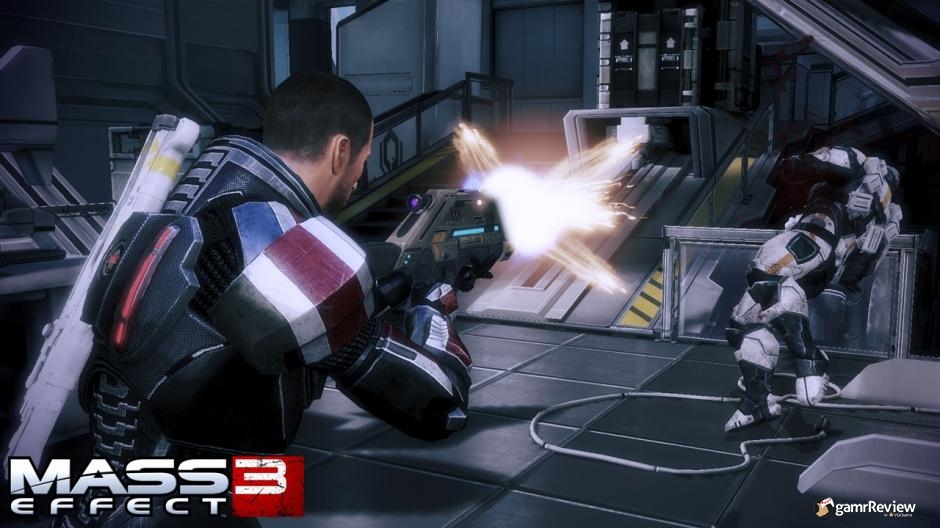
Your influence over the fate of the galaxy is far reaching in Mass Effect 3, and so is your control over the battlefield. Combat is refined from Mass Effect 2’s already great RPG-meets-third-person-shooter system, making this the most fun and responsive game in the series. You still fight alongside two squad-mates of your choice, and combine your abilities with theirs to gain tactical advantages in skirmishes. Squad AI is now much more intelligent than they were in previous games, and enemies follow suit, employing a much wider variety of tactics to make sure you don’t succeed against the Reapers.
Grenades make their return from the first Mass Effect, and are much, much less cumbersome this time around. The most prominent new gameplay addition by far, however, is Shepard’s new Heavy Melee abilities, close-quarters techniques specific to each of the six available classes. Soldier, Sentinel and Infiltrator classes get access to the extremely visceral and satisfying Omni-Blade, while biotic Adepts and Vanguards get a biotic Blast and Punch, respectively. If you go with the Engineer class, brace yourself, because you essentially punch fire.

From its inception, the Mass Effect games have always prided themselves on high production values and top-notch voice acting, and Mass Effect 3 continues this tradition. Unreal Engine 3 may be over five years old, but you wouldn’t guess it from seeing this game in action. Voice-acting is the best in the series. Characters convey emotion and personality much more effectively than previous games (which is saying a lot), and Male Shepard no longer sounds like a robot. The biggest standout is Martin Sheen’s Illusive Man, who, despite having a much more scaled back role compared to the previous game, carries an unrivaled amount of gravitas (If only the same could be said about Jessica Chobot’s much publicized character, Diana Allers. Yikes.).
Many fans lamented Mass Effect 2’s seeming abandonment of RPG elements in favor of a more action-oriented approach, and thankfully Mass Effect 3 finds the perfect balance between the two. Did you like customizing your armor and weapons in the first Mass Effect? Great, because it’s back, and with a much better interface. Ability customization is also greatly expanded, with branching skill trees opening up as you get to the higher levels for all the characters. This, combined with the ability to reassign Shepard new skills outside of his class, means that one player could potentially use the exact same team as another player’s, but employ a completely different strategy.
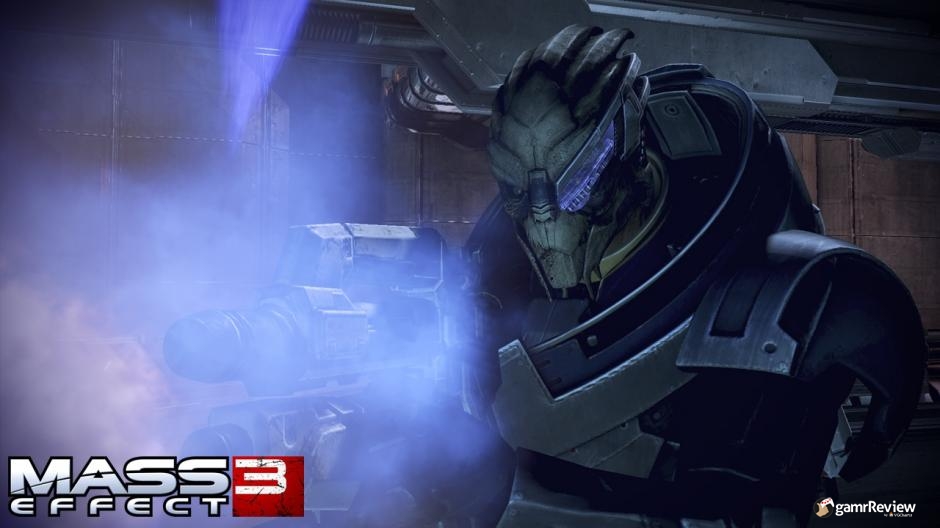
While Mass Effect 3 greatly expands your sway throughout the galaxy, it unfortunately loses a bit of its personal touch along the way. Side-quests in Mass Effect 2 were intensely personal and gripping, but in Mass Effect 3 there is somewhat of an emotional disconnect. These missions typically feature cameo appearances by characters from previous games, and while it’s great to see them again, they pretty much disappear afterwards, making it hard to feel like you’ve made much of an impact. The more minor side missions have been delegated to fetch quests accomplished by scanning planets (yes, planet scanning is back, but thankfully is much less of a chore this time around). Plus, a handful of side-quests are simply repurposed multiplayer maps thrown into the story. These levels lack the tight focus and design present in the rest of the missions, and the disparity is jarring.
Thankfully, the multiplayer itself works rather well. While it’s essentially a horde mode at its core, the RPG elements combined with the camaraderie of working with up to three teammates online helps differentiate it from the crowd. Players must work together to complete various tasks randomly assigned during each mission, and the level of teamwork required to win as the difficulty ramps up becomes exhilarating. As reward, players earn in-game credits to buy booster packs, random packages which contain new weapons, item perks, and even characters. This randomness provided a huge level of addiction to the multiplayer, though it’s a shame that you can choose which you receive by spending real-world money in EA’s online store.

For the first time in the series, you can now play as races other than human - almost every major race is available in the multiplayer, including turians, asarians, drell, and of course, krogans. The lack of batarians and Geth definitely feel like a missed oppurtunity, but the it’s hard to complain with seven already varied options, combined with the six available classes. Many were hesitant when it was announced Mass Effect 3 would have multipayer, but it ends up being a welcome addition to the franchise. Fortunately, it’s not essential to getting the full Mass Effect 3 experience; While multiplayer progress can potentially affect your outcome in the ending, the effect is minor, and I’d say there’s no reason to play it if you’re only interested in the story.
And that brings us to the elephant in the room: the ending. While it’s certainly not what we expected, I’m not sure if the extreme backlash from the internet lately is warranted. The choices you made throughout the entire trilogy do in fact affect the ending you receive, but not in the way most fans were hoping. I’ll admit, I was also initially opposed to the ending, but after a couple days to think it over, I’m glad BioWare went with a route that nobody saw coming. It sparked a reaction, and I’m pretty sure that’s exactly what they intended. Without spoiling anything, Mass Effect 3’s ending is controversial, thought-provoking, and unexpected. Honestly, I wouldn’t have it any other way.
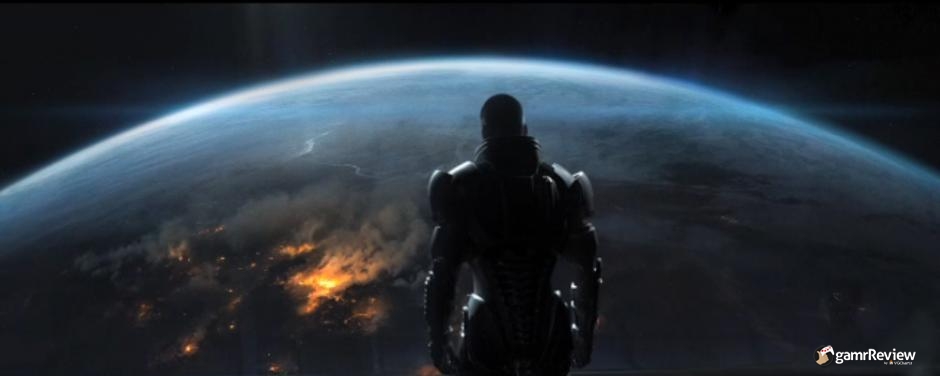
Mass Effect 3 provides an epic, emotional, and stunning conclusion to an unprecedentedly personalized trilogy. By combining the best parts of the previous games, BioWare has delivered not only the best game in the series, but an early contender for game of the year. Disappointments over the ending, as well as a couple other minor storytelling gripes may be disheartening to some, but don’t let that hold you back from immersing yourself in one of the most profound experiences in gaming.
The Kinect Factor - Nick Pantazis
Kinect makes its Mass Effect debut, but it's not a positive addition. Controlling your squad through voice commands is great in theory, but in practice the noise from your TV speakers constantly interrupts Kinect's ability to understand you. I found myself shouting to make my squad listen at all, and even then I was lucky if it worked 75% of the time. In a game that demands precise control this is completely unacceptable. You can also use it to open doors or select dialog options, but this always feels silly. In fact, I actually unplugged Kinect, because the speaker feedback made this little red microphone alert pop up constantly on my screen as I played, which was irritating. It's certainly not "better with Kinect."
This review was based off of the Xbox 360 version of the game.
VGChartz Verdict
9.4
Outstanding











